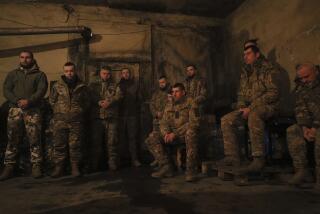A Soviet Plea for Ending Moscow’s Military Accord With Eastern Europe : Alliance: A Russian political scientist sees solid reasons for scrapping the Warsaw Pact. ‘The old paradigm of national security is hopelessly outdated.’
WASHINGTON — Today, when Eastern European governments are falling and economies are being turned inside out, when the superpowers are finding it harder to flex their military muscle, many of us in the Soviet Union are wondering why we still maintain the Warsaw Pact.
How can this bloc, established after World War II in the context of an East-West face-off, be relevant to the national security interests of the Soviet Union today? What is the purpose of a Cold War alliance whose most visible recent troop maneuvers have been trains leaving Czechoslovakia and Hungary?
Despite the pace of change in the East, some senior members of the Soviet political and military leadership argue for preserving the Warsaw Pact in some form. And they have gotten some ammunition from their North Atlantic Treaty Organization adversaries.
Last December, NATO ministers issued a communique saying: “In the midst of change and uncertainty, the alliance remains a reliable guarantor of peace. It will provide an indispensable foundation of stability, security and cooperation for the Europe of the future.”
Some Soviet military experts perceive the pact as a brake against aggression, pressure or interference from the West, which remains a very real fear to many. Marshal Sergei Akhromeyev, former chief of the Soviet general staff and currently an adviser to Mikhail S. Gorbachev, summarizes the view of Soviet doomsayers: U.S. and NATO armed forces “are not being reduced”; the United States and NATO continue to affirm the 20 year-old strategy of “flexible response” that entails preparation for a nuclear first strike on Eastern Europe and the Soviet Union, and U.S. leaders continue to speak of dealing with the Soviet Union from a “position of strength.”
This is not only the viewpoint of marshals and generals in Moscow. My father, now 74, is a retired lieutenant colonel living in Ulianovsk on the Volga River. He remembers World War II firsthand, and has often repeated Oliver Cromwell’s saying: “Put your trust in God, my boys, but keep your powder dry.” He and many other Soviet citizens vividly recall the losses and sacrifices of the Great Patriotic War and see the Warsaw Pact as an important guarantee against the threat of a new war from German territory.
But for all the force and sincerity with which many Soviets cling to these traditional views, others, including myself, see more solid arguments for scrapping the Warsaw Pact.
For one thing, it doesn’t take a cynic to wonder why many Western leaders paradoxically are more interested than the Soviets in keeping the Warsaw Pact going. Behind the talk of “aid to Gorby,” continuity, stability and so forth, is there not a wish to protect NATO’s raison d’etre? If there is no “present danger,” who will want to spend taxpayers’ money to finance a Western military alliance?
The need to find a rationale for NATO is made even more pressing by the historic changes taking place in all six of the Soviet Union’s Eastern European allies: Principles of equality and freedom of choice in relations among the countries, and developing political and economic pluralism within each, make the bogyman of a Soviet tank attack against Western Europe seem more remote than ever.
Disbanding the Warsaw Pact would ease tensions between the Soviet Union and its East European neighbors. The pact seems likely to die on its own--even more quickly than NATO. But the sooner it is put to an end, the sooner the Soviet Union will be able put relationships with its former satellites to the west on a sound footing.
Finally, the Warsaw Pact should go because we can’t afford it anymore. Americans have complained for years that they’re footing too much of the defense burden for their allies, while Japan and Germany have been freed up to outstrip them in trade. We Soviets have the same problem.
From 50% to 60% of the Pentagon budget is devoted “to protect Europe.” Soviet expenditures related to the Warsaw Pact are not published, but could account for at least as large a share of the Soviet defense budget. Political developments in the other pact countries are likely to cause them to reduce their financial contribution to the alliance. But why should the Soviets have to pay the bill? The prospects of German unification, for instance, should remind the Poles and the Lithuanians that they may need Russian protection in the future for land that was ceded to them after World War II.
Hungary, Poland and other Eastern European countries, driven by economic imperatives and political changes, are now starting to cut down the size of their armies and develop new national defense doctrines. Shouldn’t we Soviets be doing the same?
Currently, according to the International Institute for Strategic Studies in London, the Soviet Union contributes about 80% of the Warsaw Pact’s fighters and bombers, 90% of its armored personnel carriers and 70% of its tanks. So Soviets are struggling under an even heavier burden than the United States is for its allies.
These countries may wind up becoming as much a trade nemesis for the Soviet Union as Japan has been for the United States. I am reminded of an old babushka in the market complaining about the ruble drain to protect Cuba or Hungary: “When will they stop spending our money abroad and feed the Russians at home? Why are they so concerned about unfriendly foreigners and forget their own Motherland?”
At the same time, the American military presence in Europe is becoming more and more unpopular on both sides of the Atlantic. At the end of 1989, only 30% of the West Germans approved of the American presence, according to one poll. According to polls last January by Gallup and Yankelovich, a majority of Americans also favor troop withdrawals.
The process of perestroika in the Soviet Union and of political and economic change in Eastern Europe can only exacerbate the strains on the Warsaw Pact. Nevertheless, a decision to disband it will come hard, simply because for so many years, the question of its usefulness has been “zona vnye kriticki” --untouchable.
Economic and bureaucratic interests that thrived in an atmosphere of superpower confrontation will not easily abandon their hard-line views. Nor is self-interest the only obstacle to change: Old fears persist long after the circumstances from which they arose have changed. One must sympathize with those who find it paradoxical to argue that the Soviet Union’s security will be enhanced if it abandons its bloc umbrella.
But in the end, the emotional logic of the old way must yield to the real logic of the new. The old paradigm of national security, which underpins the existence of the Warsaw Pact, is hopelessly outdated in a world in which the Soviet Union seeks its security in withdrawing military forces from Afghanistan and negotiating far-reaching arms reductions at the same time that it marches toward democracy.
Soviets have to get rid of that part of their “defense consciousness” which whispers that all socialist countries are encircled by mortal enemies just waiting for signs of weakness and disunity. We need to forge a new, broader view of national security, which considers non-military factors, including our country’s economic, social and ecological health.
As for the military dimension of security, I would like us to avoid two extremes: On the one hand, we must not risk instability by reducing our military strength too much, below what is sufficient for a reasonable defense; on the other, we must not interfere with efforts to develop new all-Europe security arrangements. In time, the latter might involve the Soviet Union, Poland and other pact members joining current NATO members in a common security system.
It’s high time for the Soviet Union to stop thinking in terms of bloc politics. As a billion people build a new, integrated Europe, economic and humanitarian goals will dominate international relationships. And if the Soviet Union is to pursue Gorbachev’s goal of a “common European house,” it must let Hermes, the god of commerce, displace Mars.
More to Read
Sign up for Essential California
The most important California stories and recommendations in your inbox every morning.
You may occasionally receive promotional content from the Los Angeles Times.










